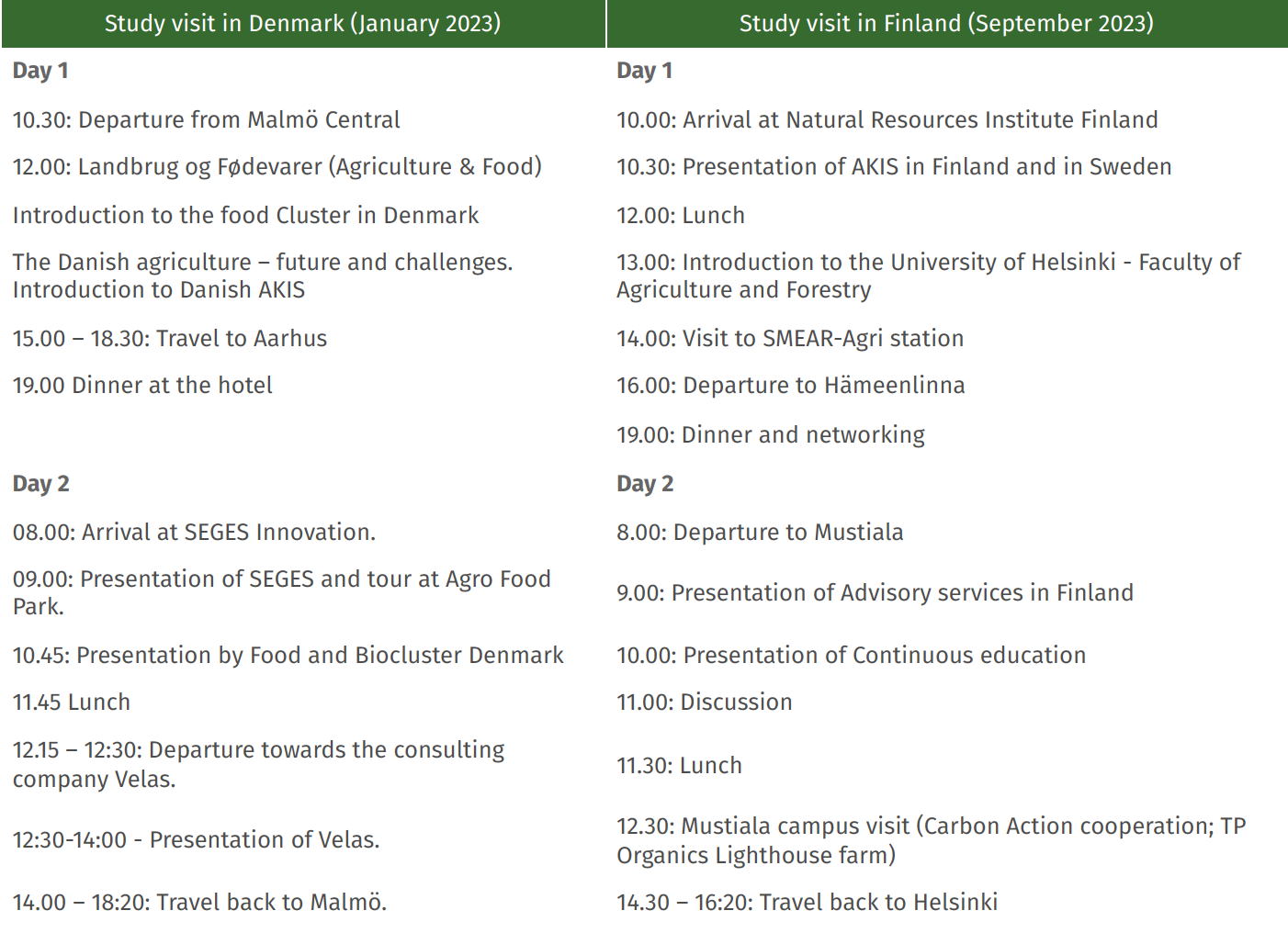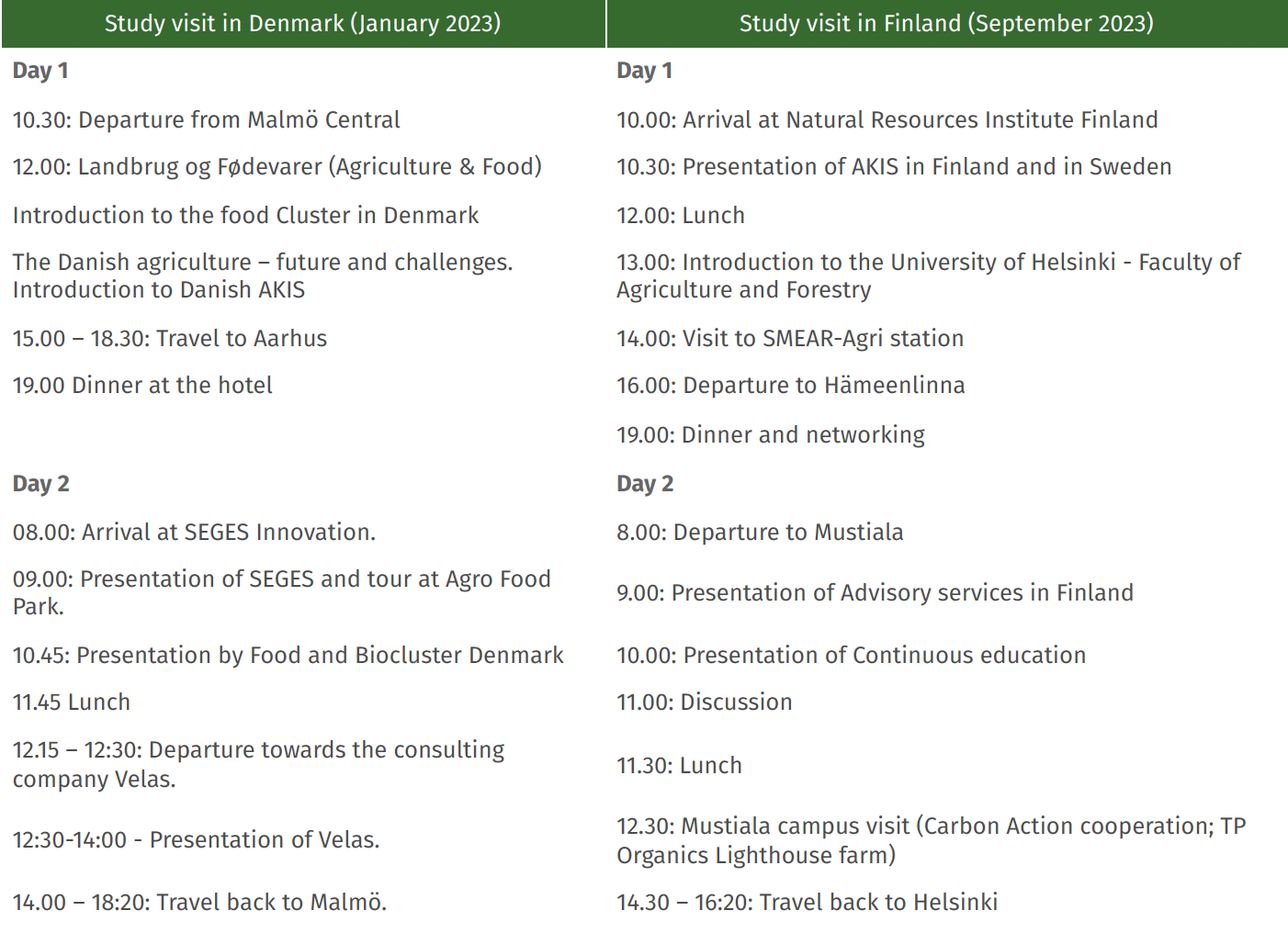2024
peer-to-peer learning
study visits

The CAP 2023-2027 regulations emphasize the need for holistic advisory services to promote sustainable agriculture. However, Swedish AKIS encounters several challenges, including fragmentation, a lack of collaboration among actors, limited knowledge resources, and disconnection between basic research, applied research, advisory services, farmers, agri-food businesses, and rural entrepreneurs. Regional disparities highlight the importance of policy coordination, both within the innovation support system and across national, regional, and local levels.
Particularly, Swedish advisory services are diverse, with different work methods and knowledge sources, often seeking knowledge abroad due to limited domestic availability. There is also no formal training for advisors in Sweden, leading to a shortage of skilled professionals.
Lately, Swedish AKIS actors have identified several needs: developing better access to relevant knowledge, strengthening collaboration between academia and practice, and fostering knowledge exchange across different regions. Besides, opportunities for Sweden lie in fostering innovation, digitization, and enhanced collaboration, with international exchanges offering a pathway to address these gaps and drive improvements in Sweden's agricultural advisory services and innovation system.
International collaborations, including study visits, offer a platform to learn from neighboring countries that have successfully integrated research and advisory services. For this purpose, some lectures were organized to introduce to the Swedish AKIS analysis group the AKIS systems of the other countries. Following this, two international study visits were organized to neighboring Denmark and Finland to look at their AKIS, strengthening CAP strategies and respective actors. During and after these trips, the AKIS analyzing group of Sweden was engaged in a collective reflection in the experience and the key lessons to follow-up within Sweden.
An AKIS analysis group has been set up and it consists of 12 members focusing discussing and analysing challenges and opportunities for Swedish national AKIS on overall system level. This group includes AKIS actors in Sweden, such as green clusters/regional innovation hubs, national knowledge hubs, research, the Federation of Swedish Farmers, the Sami Parliament, advisors, financiers. Ultimately, the Swedish Board of Agriculture that plays the role of the AKIS Coordination Body is member of this AKIS analysis group.
The support of the CAP network, the Swedish CAP network and the Finnish CAP network, was crucial for the organization of the trips on the field and the contact with the hosting bodes.The international study visits were planned by the AKIS analysis group who was directly engaged in defining content and learning programs as well as contacting the people/organizations to visit.
The study visits abroad were scheduled over two days each and the agenda included (table 2 and 3):
The agenda for each of study visits included the description of AKIS in countries, by deepening the advisory services organization, pros and cons of the different organizational models and lessons to learn. All in all, the study visits agenda were structured as showed in Table 1.
Table 1: Agenda of the two international study visits

Both visits provided the participants with great exchange and very valuable knowledge. The set-up during the visit to Denmark meant that AKIS analysis group got to know each other very well and that the commitment and cooperation were subsequently raised several levels. So, a bonus of traveling that way was that the group became tight.
Table 2: Overview of the hosting AKIS actors in Denmark
Landbrug og Fødevarer (Agriculture & Food) is Denmark's key food cluster, formed in 2009 from a merger of various agricultural organizations. It plays a vital role in the Danish economy, with exports exceeding DKK 199 billion in 2023 and employing 180,000 people. The organization represents the entire food value chain, including about 22,000 local farmers and 300 company members, ranging from large corporations to small businesses involved in food production, processing, and related services.
The company members include i.e. dairies, slaughterhouses, raw materials companies, refining and processing companies, trading companies, manufacturers of agricultural machinery, stable equipment, etc., manufacturers of machines for the food industry, manufacturers of ingredients and auxiliary substances, research and consulting companies, financial institutions and insurance companies.
Landbrug og Fødevarer is deeply integrated into Denmark's AKIS and emphasizes research, innovation, and demonstration through collaborations with universities and institutes. It offers diverse services to its members, including legal and tax assistance, market analysis, veterinary diagnostics, and a livestock welfare hotline.
Source: Landbrug og Fødevarer website
Food and Biocluster Denmark is the national cluster focused on enhancing the Danish food and bioresource sectors, which are key strengths of the Danish economy. The organization aims to unite the industry to foster innovation, development, and competitiveness both domestically and internationally. Rooted in a tradition of collaboration from the Danish cooperative movement, the cluster seeks to strengthen innovation throughout the entire value chain of food and bioresources.
The cluster's goals include supporting startups and stimulating innovation in established companies, increasing the speed and quality of innovation, and fostering an ecosystem that promotes growth. By facilitating partnerships and commercializing research-based knowledge, Food & Bio Cluster Denmark aims to enhance global competitiveness for its members, ultimately leading to improved turnover, job creation, and export share. With over 450 members, the cluster addresses significant contemporary challenges through collaboration and innovation, covering all aspects of the supply chain from primary production to the processing and distribution of food, as well as the utilization of biological residues and environmentally friendly alternatives. Membership provides access to valuable networking opportunities, knowledge resources, events, and benefits that can drive growth and business development in the industry.
Source: Food and Biocluster Denmark website
SEGES Innovation is an independent research and innovation organization dedicated to promoting sustainable and competitive agriculture and food production. SEGES Innovations integrates scientific knowledge with digital technologies to apply new insights in stables, fields, and throughout the entire value chain from farm to fork.
It develops approaches for sustainable agri-food production both in Denmark and internationally, combining professional expertise with digital skills to ensure that new knowledge is actively utilized in barns, fields, offices, and across the value chain. Established over fifty years ago, today, it can count on 500 employees and generate over DKK 600 million in revenue. The organization encompasses a diverse range of expertise, collaborating on projects with research institutes and major companies on topics such as sustainable crop and livestock production, creating attractive workplaces, and addressing climate and environmental issues. The services provision of SEGES Innovation includes digital solutions for enhancing sustainable agri-food production, tailored consulting services, events and educational opportunities, testing and trials, and data analysis to assess carbon footprints at the farm level.
Source: SEGES Innovation website
Advisory company Velas is the leading consulting firm in agriculture, ready to provide expert advice that will enhance the business of farms, based on a team of selected specialists to address a holistic advice along with specific challenges and ensuring the best tailored guidance.
As the largest consulting company in the country, it assists all agricultural areas (crop cultivation, cattle or pig production, or aspects like accounting, taxation, generational transition, and legal matters). The services offered include agricultural advice on farm management (housing construction, recruitment and salaries, business and tax matters, EU support, and accounting), comprehensive guidance in crop breeding and livestock production, and initiatives for more sustainable and modern farming practices, including climate, biodiversity, and environmental reporting.
Source: Advisory company Velas website
Table 3: Overview of the hosting AKIS actors in Finland
Natural Resources Institute Finland - Luke is a research organisation operating under the Ministry of Agriculture and Forestry of Finland. Luke’s task is to promote competitive business based on the sustainable use of renewable natural resources, as well as wellbeing and the vitality of the rural areas.
It employs some 1,300 people and operates in 24 locations in Finland. Luke resolves challenges in the sustainable and profitable use of renewable natural resources in four phenomenon-based research programmes. Every year, Luke has more than 700 research projects in progress, roughly 100 of which are EU projects.
Source: Natural Resources Institute Finland (Luke) website
University of Helsinki - Faculty of Agriculture and Forestry is a unique national institution with high international recognition, specializing in sustainable bioeconomy and related business operations. It focuses on research and education in the use of renewable resources, agriculture, food, forests, and water. Its research strengths include resilient forest and food systems, climate-smart solutions, wellbeing, and equitable sustainability transitions.Located on Viikki Campus in Helsinki, the Faculty also operates research facilities in Seinäjoki, Mikkeli, and Juupajoki. It is highly involved in international cooperation, with student and teacher exchanges primarily through Erasmus and bilateral agreements and coordinates some Erasmus+ projects related to agriculture and the environment: ECOIMPACT, FRAME, FOREHAL, CliMed.
Source: University of Helsinki - Faculty of Agriculture and Forestry website
SMEAR-agri station, the SMEAR-Agri Viikki & Haltiala measurement stations, located in Helsinki, are the first comprehensive agricultural stations in Finland dedicated to studying the impacts of agricultural land use on climate and waterways through year-round measurements. These stations, that are maintained by the University of Helsinki and part of the SMEAR network and INAR RI Agriculture infrastructures, focus on biosphere-aerosolcloud-climate interactions, biogeochemical cycles, pollutant analysis, and soil-water-carbon-nutrient budgets. Established in 2020 and 2021, the stations provide continuous data on greenhouse gas (GHG) fluxes, soil carbon, nutrient stocks, and climate-smart practices, serving as research platforms for studying the climate and air quality impacts of northern agriculture.
Source: SMEAR website
Häme University of Applied Sciences HAMK - Mustiala campus is a learning and research hub. As a university of applied sciences, it focuses on delivering high-quality education rooted in applied research. HAMK actively collaborates with businesses, public organizations, and the third sector, and is part of RUN European University, a network of eight higher education institutions from seven countries working towards a shared vision.
HAMK fosters three key innovation ecosystems: Smart Systems and Biotechnology, Smart and Sustainable Built Environment, and Smart Future Education and Capacity Building.
The university includes research specialists and multidisciplinary experts providing research, development and innovation (RDI) for raw material production, the circular economy, sustainable construction and the built environment, and future skills and education.
The HAMK Mustiala campus is an organic dairy farm that serves as a center for research, education, and innovation. In collaboration with research institutes, advisory services, and agricultural companies, the farm conducts projects focused on animal welfare and sustainable agricultural practices. It maintains 79 dairy cows, 66 young cattle, and operates 185 hectares of arable land, producing organic feed for its livestock and selling products locally. As a certified organic farm, it benefits from premium pricing, ensuring long-term economic viability. Mustiala also serves as a "lighthouse" for organic smart farming, offering courses and testing innovative technologies such as digital tools and drone imaging. Students engage in practical activities, including data collection and field trials. The farm incorporates research into daily operations, with AI-driven animal welfare studies and experiments in biochar, crop rotation, and natural weed control.
The farm collaborates with the Natural Resources Institute of Finland (Luke) and other partners to advance research in natural resources, bioeconomy, and the circular economy. It offers degree programs in Finnish and English through the Häme Vocational Institute, balancing applied research with economic sustainability, with projects supporting the farm’s financial independence.
The campus provides educational programs at the bachelor’s and master’s levels in agriculture, climate-smart farming, and bioeconomy solutions, integrating students into hands-on learning and research. The Mustiala farm is involved in EIP-AGRI Operational Groups.
Source: Häme University of Applied Sciences HAMK and Mustiala campus websites
Gerda Jonasz & Korinna Varga (2022) “Organic living labs and lighthouse farms in Europe” TPO Organics.EIP Smart Drink Dispenser 2022 project, during the study visit, the Swedish delegation had the opportunity to learn about this EIP-Agri operational group project (09/2022-12/2024; total budget €210,702.40), in which the Mustiala campus is participating. The project focuses on developing technology to measure a cow's water consumption both at an individual and herd level. Monitoring water intake can enhance the early detection of changes in welfare, behavior, and productivity.
Source: EIP Smart Drink Dispenser 2022 project website and EU CAP Network